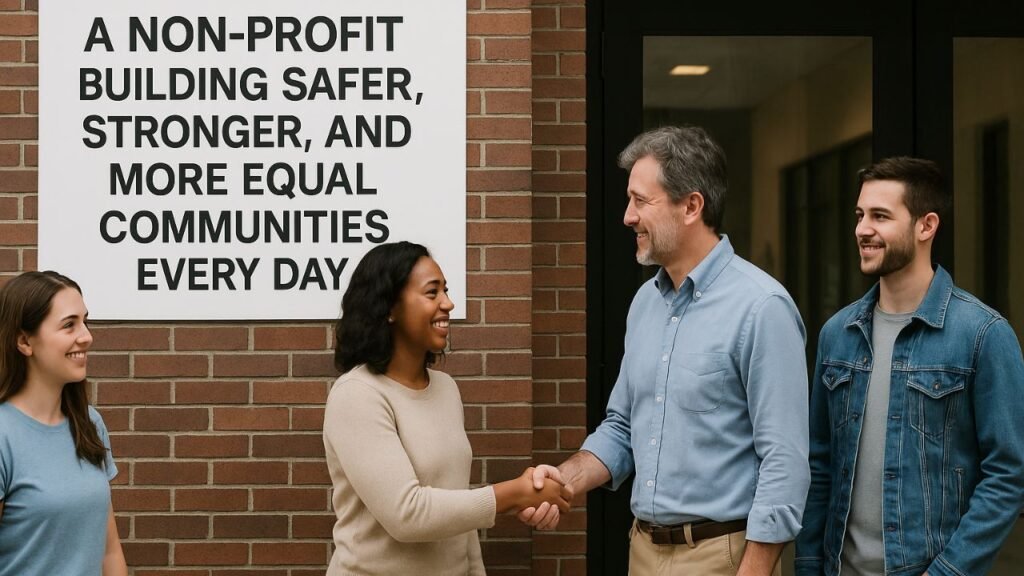Non Profit Building – Non-profit organizations play a vital role in addressing social challenges by empowering communities and ensuring no one is left behind. At their core, they work with the mission of creating safer neighborhoods, stronger social bonds, and equal opportunities for everyone, regardless of their background. These organizations often step into spaces where governments and private businesses may not fully reach, offering services in health, education, women’s empowerment, and poverty alleviation. By combining community participation with professional expertise, they develop programs that uplift the marginalized and amplify voices that are often unheard. For example, many nonprofits partner with global initiatives to tackle inequality, promote peace, and create inclusive societies. Reports by the United Nations Sustainable Development Goals highlight the importance of grassroots action in reducing inequalities and building peaceful communities. This approach ensures that real, everyday change is not just imagined but actually implemented in people’s lives.

Creating Safer Communities Through Awareness and Support
Safety is a fundamental need, and nonprofits address this by focusing on violence prevention, child protection, and advocacy against gender-based abuse. These efforts include running awareness campaigns, providing shelter to vulnerable groups, and offering mental health counseling to those in crisis. Initiatives such as community policing and neighborhood watch programs, often supported by civil society groups, also strengthen trust between residents and law enforcement. A well-documented example is the WHO’s global framework on preventing violence against women, which underlines the role of NGOs in education and intervention. By building safe spaces where women, children, and marginalized groups can thrive, nonprofits help create neighborhoods where people feel protected, respected, and valued. Such interventions not only prevent harm but also nurture a culture of empathy and mutual care.
Strengthening Social Bonds With Community-Driven Programs
One of the biggest strengths of nonprofits lies in their ability to bring people together for a shared cause. From local food distribution drives to vocational training, these organizations build networks that ensure collective growth. Community-driven initiatives often prioritize inclusivity, making sure that youth, women, and elders all have access to opportunities. Programs such as skill-building workshops, literacy campaigns, and rural livelihood initiatives create self-reliant individuals who, in turn, contribute positively to society. Research shared by Brookings Institution notes that community-driven development can significantly improve public trust and local governance. By involving community members in decision-making and execution, nonprofits ensure that solutions are practical, relevant, and sustainable. These grassroots models strengthen resilience and ensure that progress is not just top-down but deeply rooted in people’s everyday experiences.
Promoting Equality and Justice for All
Equality remains a central pillar of nonprofit work, as they strive to close gaps in access to education, healthcare, and employment. By advocating for policy reforms, offering scholarships, and running campaigns on inclusivity, nonprofits work tirelessly to create a fairer system. This includes fighting discrimination based on gender, race, caste, or economic status. Nonprofits also act as watchdogs, holding institutions accountable and ensuring that marginalized communities are not overlooked. According to Amnesty International, advocacy and awareness by civil society are critical to ending systemic discrimination worldwide. Whether it’s supporting women entrepreneurs, defending workers’ rights, or ensuring digital access for rural populations, these organizations build pathways where equality is more than an idea—it becomes a lived reality.
Everyday Impact: Building Hope and Resilience
The real strength of nonprofit organizations is reflected in the daily impact they create. Every scholarship granted, every child fed, and every skill-training session conducted contributes to long-term social progress. Unlike short-term projects, their ongoing presence in communities allows them to adapt and respond to evolving needs. This adaptability makes nonprofits essential partners in humanitarian responses, disaster relief, and long-term development planning. The International Red Cross and similar organizations showcase how non-profits can mobilize quickly to provide life-saving services, while also investing in resilience-building for the future. By empowering individuals with education, health access, and economic opportunities, nonprofits build cycles of positive change that uplift not just one person, but entire communities. In doing so, they ensure that hope, dignity, and equality are renewed every single day.







